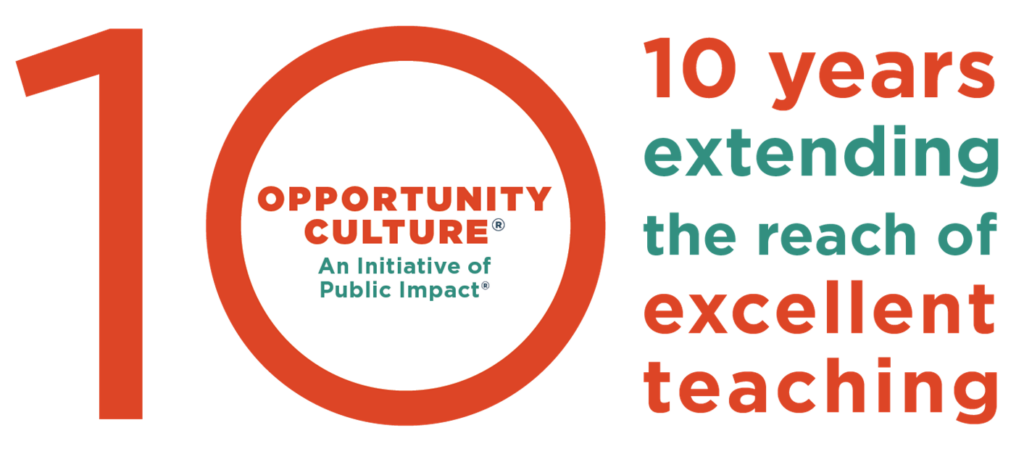We’re closing out our celebration of the first decade of the Opportunity Culture® initiative—going from a few pioneering schools and districts to the nearly 200,000 students who will be reached next year by excellent teaching. We rejoice over the student learning growth seen so far, the $57.9 million in extra pay that has gone to educators, and the teacher support and collaboration that has been a hallmark of this initiative since day 1.

But looking back to celebrate ignores the significant learning being left on the table in schools that still rely on the one-teacher, one-classroom model. So Public Impact®, which founded this initiative, relentlessly learns from our results and takes urgent steps to make our support more accessible and focused on the things that matter most—because kids can’t wait another decade for these results to reach them.
Over the next few weeks, we’ll highlight several keys to success that are our focus areas over the upcoming school year, starting with a key from the very beginning: the five Opportunity Culture® principles.
The principles call for teams of teachers and school leaders to choose and tailor models to:
- Reach more students with excellent teachers and their teams
- Pay teachers more for extending their reach
- Fund pay within regular budgets
- Provide protected in-school time and clarity about how to use it for planning, collaboration, and development
- Match authority and accountability to each person’s responsibilities
Ten years ago, we believed, based on extensive research and new thinking, that these principles would be key, and they set the initiative apart from other early staffing innovations. Several years in, studies on pioneering schools implementing Opportunity Culture® models began to back up our belief, and now, as we continue to look at schools’ data each year, we believe even more strongly that the principles are a key to success—and schools must follow all of them.
Our review of the most recent data shows that schools that adhere to all five principles were three times more likely to make high learning growth schoolwide than other schools implementing the models.
The Power of the Principles
The principles support one another. New roles that allow educators to extend their reach—taking on far more responsibility—should pay more. Higher pay must be funded with regular budgets, not temporary sources, so that advanced roles last. Just implementing new reach-extending roles with higher pay may begin to move schools’ results, but not as much as they should if, for example, schools fail to follow principle 4, providing protected time for these roles. School leaders may think they can never provide adequate time, but our many examples show how, with careful scheduling, teachers can have time for both personal and team planning, collaboration, and meaningful development that benefits students.
And even if schools follow the first four principles but fail to focus on both aligned authority and accountability, their results may fall short. Greater responsibility should be formalized, so that evaluations match each advanced role, and colleagues know who has authority to lead.
Following each and every principle, in letter and spirit, is the only way for schools to achieve excellence consistently and sustainably. Delaying full implementation of any principle reduces student learning, makes teachers’ jobs harder, and creates problems that must be fixed later.
